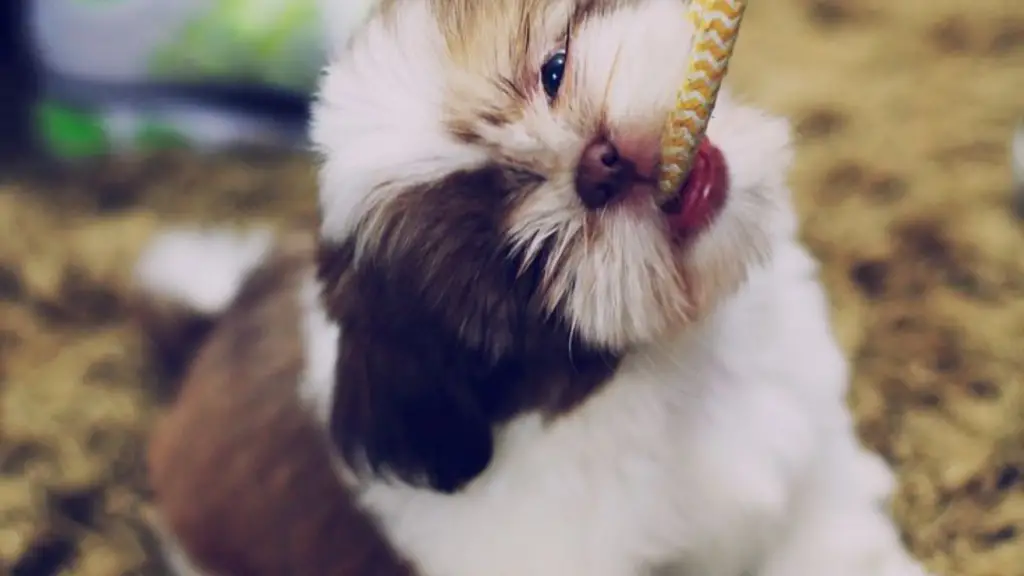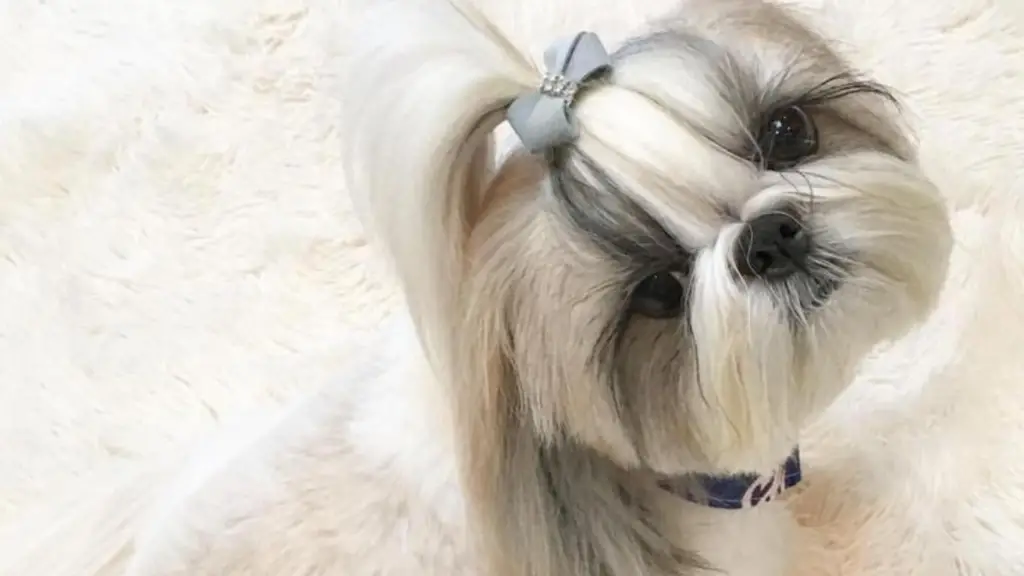
Shih Tzus are known for their loving and affectionate nature, often forming strong bonds with their owners. While this is usually a positive trait, it can sometimes lead to separation anxiety when they are left alone. Common signs of separation anxiety in Shih Tzus include excessive barking, destructive behavior, and pacing. These behaviors are usually a result of stress and anxiety caused by being apart from their owners. To help your Shih Tzu manage separation anxiety, it’s important to establish a consistent routine and provide plenty of mental stimulation, such as puzzle toys or interactive games. Additionally, gradually increasing the amount of time your Shih Tzu spends alone can help them adjust to periods of separation.
Excessive Barking: Understanding the Cause

Barking is a natural way for dogs to communicate, but excessive barking can become an issue if not addressed. Shih Tzus may bark to alert you to a perceived threat, express excitement, or seek attention. If your Shih Tzu is barking excessively, it’s important to identify the underlying cause. Boredom, anxiety, and lack of exercise are common reasons for excessive barking in this breed. Ensuring your dog has plenty of daily physical activity and mental stimulation can help reduce this behavior. If barking persists despite these efforts, you may need to work with a professional trainer to modify your dog’s behavior.
Chewing and Destructive Behavior

Chewing is a normal behavior for dogs, especially during teething, but it can become problematic if your Shih Tzu starts chewing on furniture or household items. This behavior is often a sign of boredom, anxiety, or lack of proper chew toys. Providing appropriate chew toys and engaging your dog in regular play sessions can help satisfy their natural chewing instincts and prevent destructive behavior. Additionally, crate training or confining your Shih Tzu to a safe space when you’re not home can prevent them from damaging your belongings.
Socialization: How Shih Tzus Interact with Others

Shih Tzus are generally friendly and sociable dogs, but like all breeds, they need proper socialization to feel comfortable around other dogs and people. Without adequate socialization, your Shih Tzu may become fearful or aggressive in unfamiliar situations. Introducing your dog to new environments, people, and animals from an early age is essential for developing positive social behaviors. Regular trips to the dog park, playdates with other dogs, and exposure to different environments can help your Shih Tzu become well-adjusted and confident.
Stubbornness or Independence?

Shih Tzus are known for their independent streak, which can sometimes be mistaken for stubbornness. While this breed is intelligent, they may not always be eager to follow commands, especially if they don’t see the point in doing so. Patience and positive reinforcement are key when training a Shih Tzu. Offering treats, praise, and rewards for good behavior will motivate your dog to follow instructions. Avoid using harsh punishments, as they can lead to fear or anxiety and may worsen behavioral issues.
Separation Anxiety: What’s Normal and What’s Not

Shih Tzus form strong attachments to their owners, and it’s not uncommon for them to experience some level of anxiety when left alone. However, excessive displays of separation anxiety, such as constant barking, destructive behavior, or inability to settle, may indicate a deeper issue. Training your Shih Tzu to feel comfortable with alone time is crucial. Start by leaving them for short periods and gradually increase the duration. Providing them with interactive toys or treats can keep them occupied while you’re away, making the transition easier.
Jumping on People: Why It Happens

Jumping on people is a common behavior in Shih Tzus, especially when they’re excited to greet someone. While this behavior is usually harmless, it can become problematic if your dog jumps on guests or small children. Teaching your Shih Tzu the “sit” command as an alternative to jumping is an effective way to manage this behavior. Consistently rewarding your dog for sitting calmly when greeting people will help reinforce this positive behavior over time.
Normal Play Behavior: When It’s Time to Intervene

Shih Tzus love to play, but it’s important to know the difference between normal play behavior and overexcitement that could lead to injury. Normal play includes behaviors like chasing, wrestling, and play-biting. However, if your Shih Tzu’s play becomes too rough or they start showing signs of aggression, it’s important to step in and redirect their behavior. Providing appropriate toys and encouraging gentle play can help prevent roughhousing from getting out of hand.
Digging: A Normal Instinct

While Shih Tzus aren’t known for being avid diggers, some dogs may engage in this behavior as part of their natural instincts. Digging is often a sign of boredom, anxiety, or a desire to create a comfortable resting spot. If your Shih Tzu starts digging in your yard or indoors, it’s important to provide alternative outlets for their energy, such as interactive toys, puzzle feeders, or extra playtime. If digging continues to be a problem, you may need to supervise your dog more closely when they’re outside and redirect their attention to more appropriate activities.
Aggression: What’s Normal and What’s Not

Although Shih Tzus are known for their sweet and gentle nature, aggression can still occur, particularly if they feel threatened or are in pain. It’s important to distinguish between normal displays of aggression, such as growling when startled, and problematic aggression, which may be consistent or unprovoked. If your Shih Tzu is showing signs of aggression toward people or other animals, it’s important to address the issue early on through training and behavior modification. In some cases, fear-based aggression can develop if a Shih Tzu has had a traumatic experience, so it’s important to work with a professional to identify and resolve the root cause of the behavior.
Separation Barking: Addressing Excessive Vocalization

As mentioned earlier, Shih Tzus can be prone to separation anxiety, and one of the most common symptoms of this condition is excessive barking when left alone. This vocalization often occurs because your dog is feeling anxious or stressed about being separated from you. To address this issue, it’s important to create a calm, reassuring environment when you leave, and gradually increase the amount of time your dog is left alone. In some cases, training your Shih Tzu to feel comfortable with short periods of separation can significantly reduce barking. If the problem persists, a professional trainer or behaviorist may be able to help.
Hyperactivity vs. Boredom

Shih Tzus may be small, but they can still exhibit bursts of energy that leave you wondering whether your dog is hyperactive or simply bored. Normal bursts of energy, often referred to as “zoomies,” are common in Shih Tzus, particularly after a bath or a nap. However, if your Shih Tzu is constantly restless, chewing on furniture, or engaging in destructive behavior, they may be bored and in need of more mental or physical stimulation. Shih Tzus benefit from daily walks, playtime, and interaction with their owners. Interactive toys and puzzle feeders can also help keep your Shih Tzu entertained and mentally stimulated, reducing hyperactive behaviors caused by boredom.
Affection vs. Clinginess

Shih Tzus are known for their affectionate nature, often seeking out cuddles and following their owners around. However, it’s important to recognize the difference between normal affection and clinginess. If your Shih Tzu becomes overly attached, refusing to leave your side even for a short period, they may be displaying signs of separation anxiety or insecurity. It’s important to strike a balance by providing plenty of affection while also encouraging independent behavior. Giving your Shih Tzu opportunities to explore their environment, interact with other dogs, or engage in solo activities can help them feel more confident and less reliant on your constant presence.
Eating Habits: What’s Normal?

Shih Tzus have specific dietary needs, and their eating habits can provide insight into their overall health. Normally, a healthy Shih Tzu will have a consistent appetite and eat their meals with enthusiasm. However, picky eating is a common issue in this breed, with many Shih Tzus turning their noses up at certain foods or refusing to eat their meals altogether. It’s important to establish a feeding routine and offer nutritionally balanced meals to ensure your dog is getting the nutrients they need. Sudden changes in appetite, such as refusing food or overeating, could indicate a medical issue, so it’s important to consult your vet if you notice significant changes in your dog’s eating habits.
Grooming and Behavior: Why Does My Shih Tzu Act Out?

Grooming is an essential part of caring for a Shih Tzu, but it can also be a source of stress for some dogs. It’s not uncommon for Shih Tzus to exhibit resistant behaviors such as squirming, growling, or attempting to escape during grooming sessions. These behaviors can stem from discomfort, fear, or negative associations with past grooming experiences. To help your Shih Tzu feel more comfortable with grooming, it’s important to introduce grooming routines gradually, using treats and positive reinforcement to create a positive experience. Regular grooming can help prevent matting and skin issues, making the process more comfortable for both you and your dog over time.
Conclusion
Understanding your Shih Tzu’s behavior is key to ensuring their happiness and well-being. While certain behaviors like barking, chewing, and digging are normal, it’s important to address any excessive or problematic behaviors early on. Providing regular mental and physical stimulation, proper socialization, and positive reinforcement during training can help your Shih Tzu develop healthy behaviors. If your dog’s behavior becomes difficult to manage, seeking help from a professional trainer or behaviorist can make all the difference. By recognizing what’s normal and what’s not, you’ll be better equipped to support your Shih Tzu’s needs and foster a positive, loving relationship.


